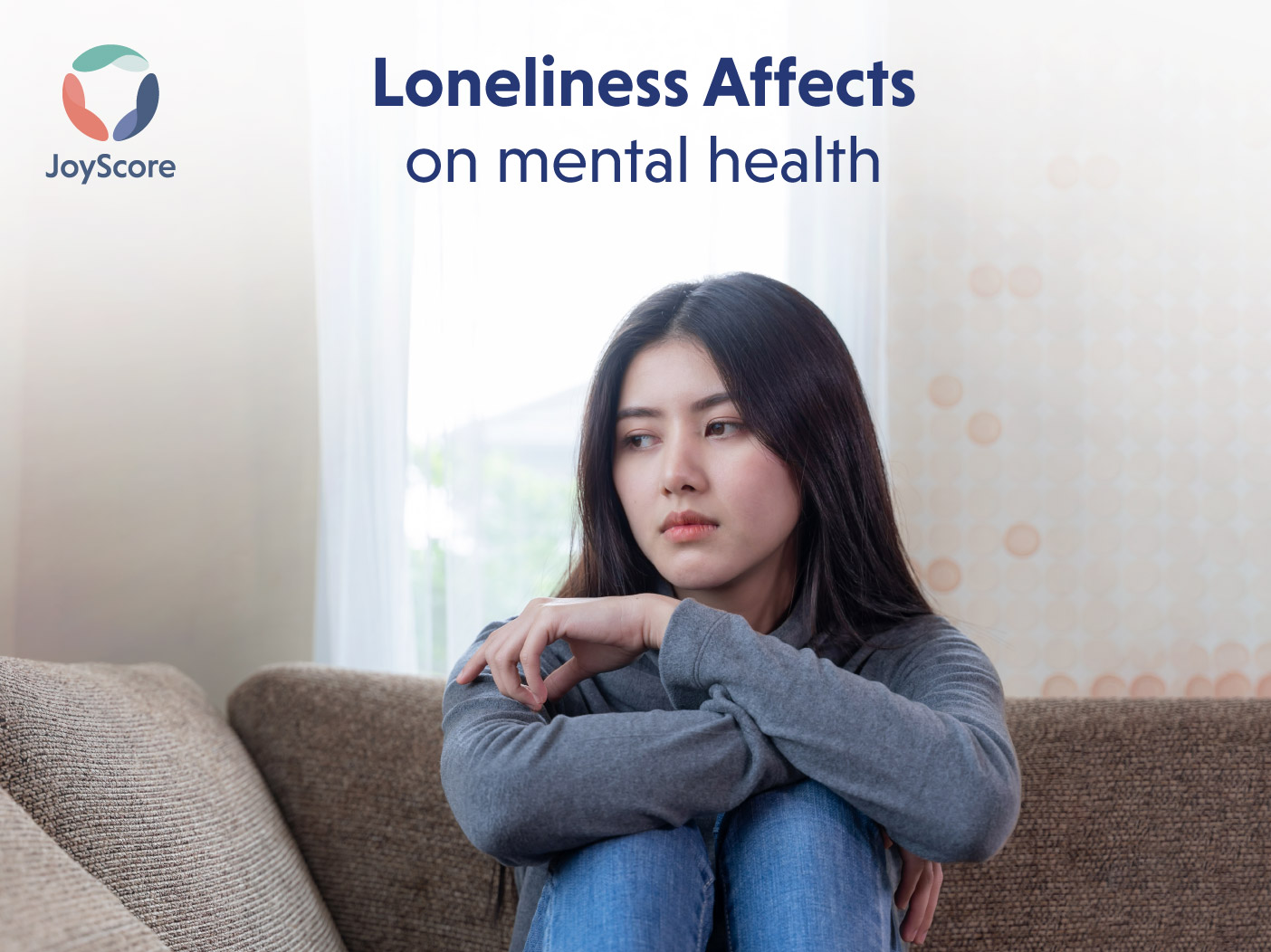Loneliness affects mental health
Loneliness is not only mentally painful, but it is also bad for our health. According to research, loneliness is associated with an increased risk of mood disorders like depression and anxiety, stress, and problems with sleep, as well as physical health problems like high blood pressure, heart disease, and stroke. Older adults who feel socially isolated are at an increased risk of dementia. It is essential to know loneliness’s effects on mental health. It can affect anyone at any age, but there are ways to connect with others. Some people find social networking helpful. Others enjoy joining groups or attending events. The important thing is to find ways to connect and feel connected. This article will explore the effects loneliness has on mental health, its dangers, the different types of loneliness you may experience, and how to prevent it before it becomes an issue later in life. To know more about loneliness and its danger, download Joyscore.
What is loneliness?
First, let’s address what loneliness is. Loneliness is perceiving a lack of close relationships with people in your life. It is a feeling of being disconnected from others and can negatively impact mental health. Loneliness is different from social isolation, which is having limited contact with others due to living in a rural area, being disabled, or having a busy work schedule that keeps you from maintaining meaningful relationships. Loneliness can’t be “fixed” with internet usage. While it’s true that online communication can be helpful for some people, there needs to be more to address the core issue of feeling disconnected from others in your life.
Loneliness affects mental health in modern society.
There are many ways that loneliness can cause problems in your life. The cause of loneliness can be pinpointed even more clearly by looking at our society. Many people feel lonely because they have no friends or family members nearby. Feeling connected with others is challenging when you don’t have close family or friends nearby. And today, many people choose to live without getting married and having their own families. Always remember that there are ways to make yourself feel more connected to others, even if they’re not physically present. With a little effort, you can overcome loneliness and ensure you’re not feeling sad or blue every day.
The link between loneliness and mental health issues
Many people think that loneliness is just a feeling or that it’s something that you can get over by simply talking to people. But the reality is that loneliness is much more significant than that. The relationship between loneliness and mental health disorders is strong and can have serious consequences. Loneliness’s effects on mental health have been linked to increased feelings of depression, anxiety, and isolation. It can also boost feelings of worthlessness, self-criticism, and a general disconnect from others. Loneliness is so closely linked to mental health issues that researchers often refer to it as social isolation syndrome. It can increase feelings of depression and anxiety and can also be detrimental to one’s overall health. People with chronic loneliness develop health issues like cardiovascular disease, diabetes, obesity, and sleeping disorders. Loneliness can create a vicious cycle that spirals into depression. This is because isolation can lead to negative thoughts and feelings. Negative thoughts can lead to negative behaviors, making you feel even more alone. This cycle of loneliness and depression is a common one. The most at-risk groups for it are — teenagers, young adults, and the elderly. But it can happen to anyone at any time.
Loneliness among senior citizens and teenagers
Mental illness develops at any age, but it is mainly found among teenagers and Senior citizens. Teenagers feel like they don’t fit in with their friends and feel weak and exposed when they’re away from their families. Senior citizens who feel lonely may have trouble interacting with their family and community members. They may also have trouble finding activities that they enjoy. Lonely senior citizens may benefit from seeing a doctor or therapist to discuss any mental health issues they may be struggling with. It’s important to remember that loneliness doesn’t discriminate. And its effects aren’t inevitable. All you need to do is learn how to cope with it.
Loneliness affects mental health and causes.
A mental illness is not inevitable, but certain factors may increase your risk. Some of these factors include:
- Financial difficulties,
- Loss of a loved one,
- Divorce,
- Adverse life events,
- Diabetes,
- Traumatic brain injury,
- Military combat,
- Assault,
- Abuse or neglect,
- Emotional abuse,
- Chronic medical conditions
- Few friends or poor relationships

Loneliness effects on mental health and danger
The dangers of loneliness are vast, and they’re incredibly prevalent in our society. A recent study found that loneliness can seriously affect our mental and physical health, just like many other serious diseases.
- Loneliness has been linked to shorter lifespans, which is especially concerning since it can affect people as young as 10.
- Loneliness can affect your well-being and confidence, making it more difficult for you to interact with others.
- Loneliness can lead to bad health habits. 43% of people who felt loneliness turned to binge eating, 34 % smoked cigarettes, and 21% used alcohol or drugs to soothe their feelings
- Loneliness can interfere with your sleep. Among older adults, loneliness has also been linked to insufficient sleep. Researchers have suggested that we feel secure in our surroundings for a genuinely restful night’s sleep.
- Loneliness can increase your depression. Loneliness is a significant risk factor for developing depression, with many symptoms overlapping (like experiencing feelings of pain and helplessness).
- Loneliness triggers chronic inflammation. The body continues to send distress signals despite no injury or danger. This chronic inflammation causes chronic health problems like heart disease, diabetes, rheumatoid arthritis, and cancer.
- Chronic loneliness can increase the risk of dementia. Adults who report greater loneliness have a 40 percent increased risk of developing dementia and other cognitive impairments.
Signs of loneliness
In addition, when you’re in a state of loneliness, your body releases cortisol, a stress hormone. Cortisol is a helpful hormone when you’re under pressure at work or dealing with a stressful personal issue. But when your cortisol levels remain high, it can have negative consequences. Loneliness also increases your brain’s sensitivity to cortisol, which means that your mood is more likely to be affected by high cortisol levels. If you become accustomed to loneliness, you’re more likely to experience mental health issues like depression, anxiety, and even suicidal ideation. Loneliness can make it challenging to form meaningful relationships, making existing relationships more difficult. Without the support of others, it becomes much more likely that you’ll experience mental health issues. Signs of loneliness:
– You may feel less inclined to pursue meaningful relationships, as you don’t deserve them or don’t know how to make them happen.
– You may be less likely to seek professional mental health treatment since you think you can handle the situation independently.
– You may be more likely to interpret other people’s actions as signs of rejection or dislike.
– You may be more likely to experience negative emotions, like fear and sadness, which can lead to depression.
– You may interpret stressful situations as more significant than they are, which can lead to anxiety.
Prevention

You can do many things to prevent loneliness from becoming a severe issue. Loneliness can be combated by making an effort to reach out to others.
- You can try joining clubs and organizations, attending events that interest you or pursuing relationships with people you already know.
- Increasing your resilience and boosting low self-esteem may help keep your symptoms under control.
- Consider a doctor or therapist to understand what triggers your symptoms.
- Let your family members or friends know about your warning signs.
- Get routine medical care. Pay attention to checkups or skip visits to your primary care provider, especially if you aren’t feeling well.
- Sufficient sleep, healthy eating and regular physical activity are needed to maintain a healthy life.
- Try to maintain a regular schedule.
- Trouble sleeping can be fixed with a good diet and physical activity.
Download on the Appstore
Get it on Google Play



